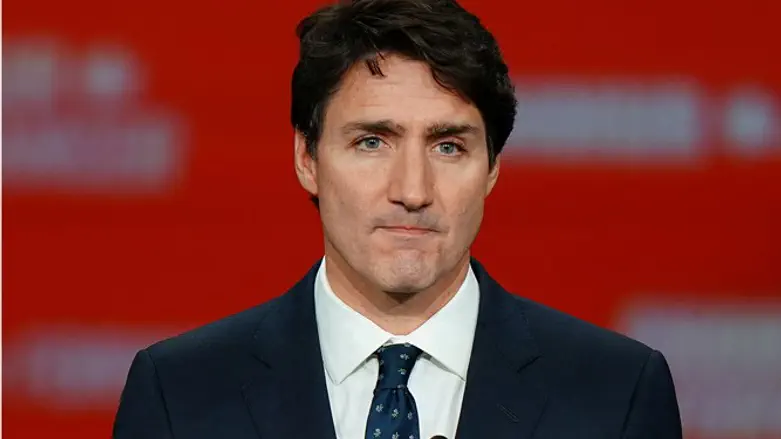
Canada on Tuesday changed course and voted in favor of a UN resolution in support of Palestinian Arabs' right to self-determination, the CBC reports.
Before Tuesday, Canada had declined to support substantially the same resolution through 14 consecutive votes since former Prime Minister Stephen Harper came to power in 2006.
Tuesday's resolution was opposed by Israel, the United States and five Pacific island nations: the Marshall Islands, Nauru and the Federated States of Micronesia.
An official at Global Affairs Canada said the vote sends a message that Canada does not agree with US Secretary of State Mike Pompeo's assertion on Monday that Israeli communities in Judea and Samaria are "not, per se, inconsistent with international law."
The official added that Canada has in the recent past opposed motions that are consistent with its own policy positions — to send a message that it considered the UN's focus on Israel's sins one-sided and inconsistent with the treatment of other nations. The official further said that Tuesday’s vote reflected core Canadian principles on the Israeli-Palestinian conflict, which include embracing a two-state solution with viable borders for both peoples.
Tuesday’s vote represents a sudden shift in the direction of Canada's policies on the Middle East, which began to drift toward a more pro-Israeli stance under former Liberal prime minister Paul Martin. That trend accelerated dramatically under the Conservative government of Stephen Harper.
Current Prime Minister Justin Trudeau has also expressed support for Israel but has also renewed funding to UNRWA that was frozen during Harper’s time in office and has called for a probe of Gaza violence while failing to mention Hamas’ role in the violence.
The resolution that Canada supported on Tuesday does not include harsh language condemning Israel, language Canada has objected to in the past, noted the CBC. It does, however, contain language that criticizes the border wall Israel has built and stresses "the urgency of achieving without delay an end to the Israeli occupation that began in 1967" and calls on all states "to continue to support and assist the Palestinian people in the early realization of their right to self-determination."
A Global Affairs Canada official told CBC that of all the resolutions, this was the easiest to adopt. The official said Canada could vote differently than it has in the recent past on resolutions regarding Israel that are coming up in November and December, although there are no current plans to do so.
Responding to Canada’s vote, the Centre for Israel and Jewish Affairs (CIJA) expressed deep disappointment.
CIJA National Co-Chair Joel Reitman commented, “While Foreign Minister Chrystia Freeland offered assurances that no other changes in vote were being contemplated, we are very disappointed that the Government of Canada did not stand firm in opposition to the annual Israel-bashing ritual at the UN General Assembly. That neither this resolution nor any other currently being considered even acknowledge the obscene barrage of Palestinian-launched rockets and missiles raining down on Israel’s civilian population reflects just how distorted and one-sided these resolutions are.”
CIJA National Co-Chair Jeffrey Rosenthal added, “Canadian support for a resolution that references the Disputed Territories as 'Occupied Palestinian Territories' represents a distressing departure not only from the Canadian voting record at the UN, but a betrayal of longstanding Canadian foreign policy that rejects prejudgment of the outcome of negotiations between Israel and the Palestinians. Palestinian self-determination cannot come at the expense of Israel’s security. Indeed, UNSC resolution 242 makes Palestinian statehood conditional on Israel’s acceptance as a legitimate state in the region and its ability to survive and flourish free of threats - whether those threats are authored by Palestinians, Iranians, or their various proxies in Lebanon, Syria, or Gaza.”
